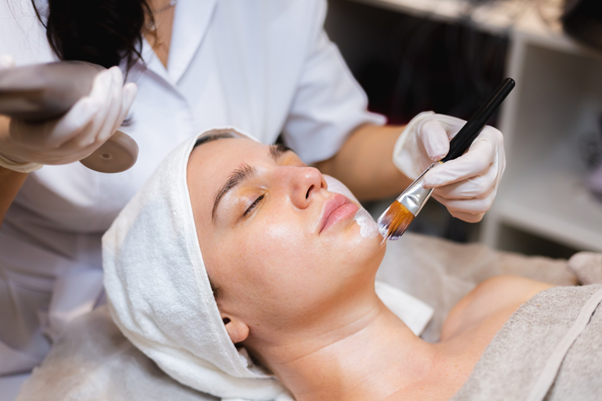Chemical peeling is a popular skincare treatment that helps you achieve smoother, clearer skin by removing damaged outer layers.
Curious about how it works and what it can do for you? Here’s a straightforward guide to chemical peels.
What is a Chemical Peel?
A chemical peel involves applying a chemical solution to your skin. This solution causes the top layer of your skin to peel off, revealing fresh, new skin underneath. Peels can be used on your face, neck, or hands.
Types of Chemical Peels
- Superficial Peels: Also known as light peels, these use mild acids like glycolic acid. They treat minor issues like dry skin and rough texture with minimal downtime.
- Medium Peels: These use more vital acids, such as trichloroacetic acid (TCA), to address more noticeable problems, such as sun damage and uneven skin tone. Recovery usually takes about a week.
- Deep Peels: The strongest type uses acids like phenol. Deep peels tackle serious issues like deep wrinkles and severe sun damage. They require a more extended recovery period and are usually done with sedation.
Benefits of Chemical Peeling
Chemical peels can:
- Smooth Skin: Help reduce rough patches and fine lines.
- Even Out Skin Tone: Minimize dark spots and hyperpigmentation.
- Treat Acne: Clear up breakouts and lessen acne scars.
- Refresh Your Look: Make your skin appear brighter and more radiant.
What to Expect
During the Peel:
- Preparation: Your skin is cleaned, and sensitive areas may be protected.
- Application: The chemical solution is applied, which might feel tingly or warm.
- Peeling: After a few minutes, the solution is neutralized and removed.
After the Peel:
- Redness and Peeling: Your skin may look red and start peeling. This is normal.
- Healing Time: Recovery varies, with deeper peels taking several days to weeks.
- Sun Protection: Protect your skin from the sun to avoid further damage.
Getting Ready for a Chemical Peel
Before you get a chemical peel:
- Consult a Dermatologist: Make sure the peel is right for you.
- Review Medications: Let your dermatologist know about any medications you’re taking.
- Prepare Your Skin: You might need to stop certain products or treatments before you peel.
Chemical peels are a great way to refresh your skin and tackle various issues. Understanding the different types, benefits, and what to expect helps you make an informed choice. For the best results, consult a dermatologist to find the perfect peel for your skin.


